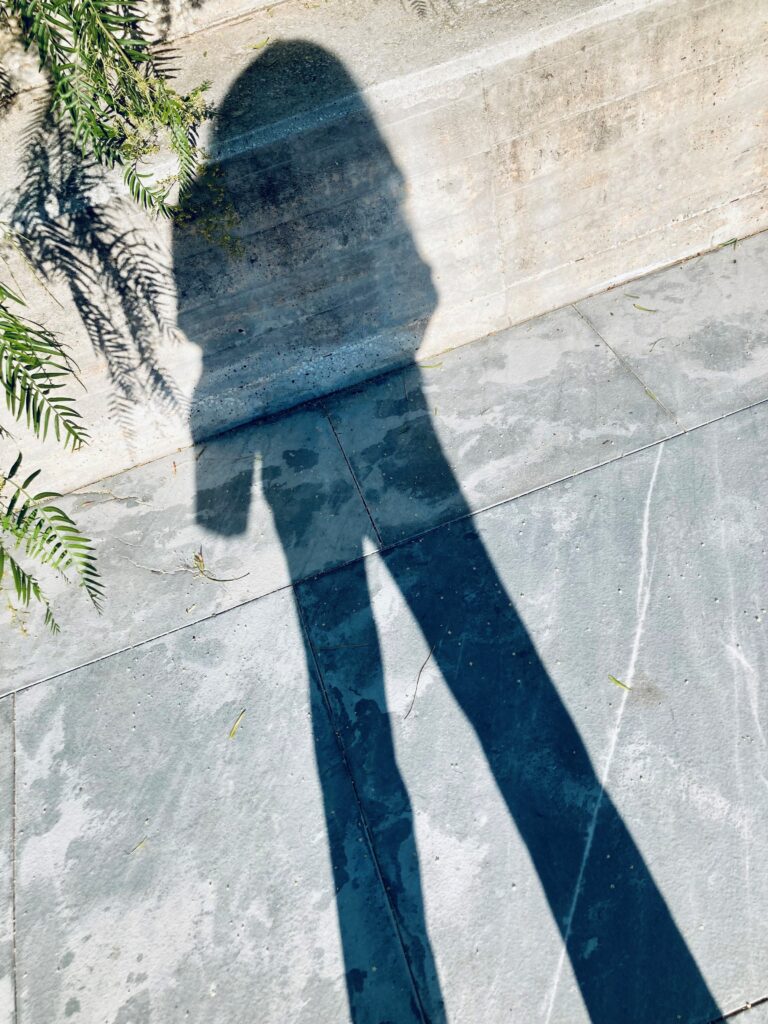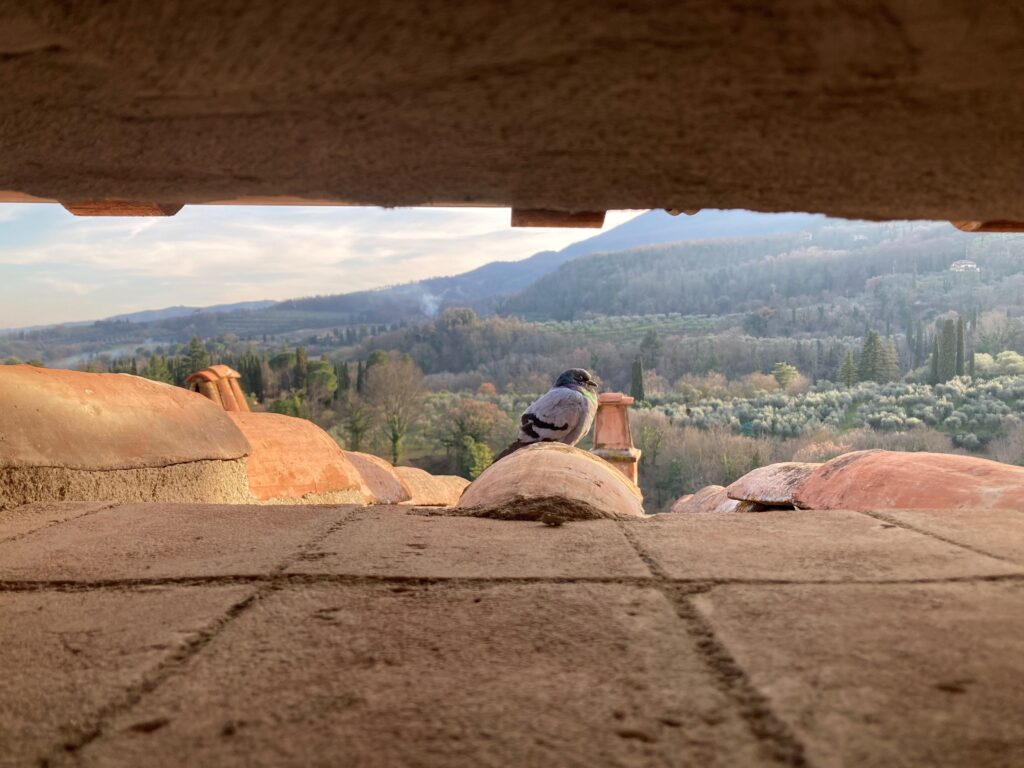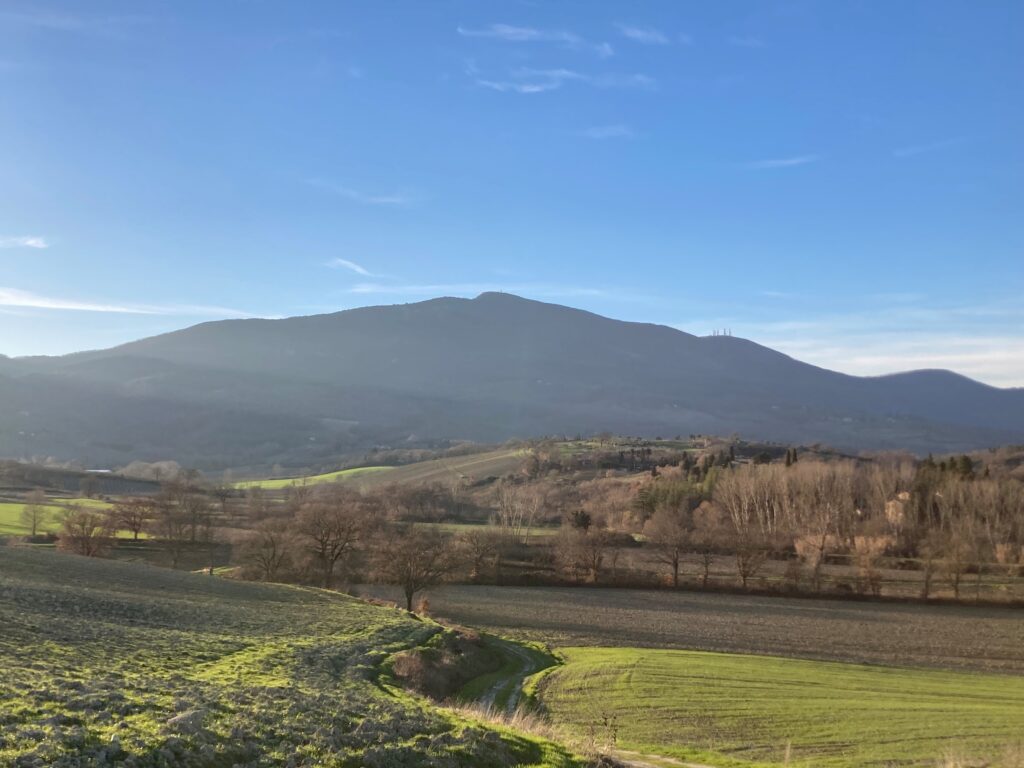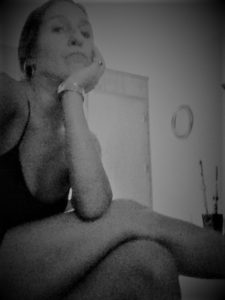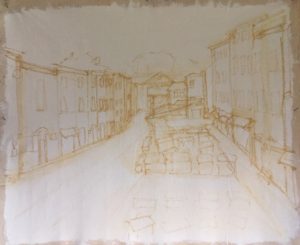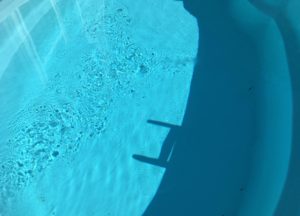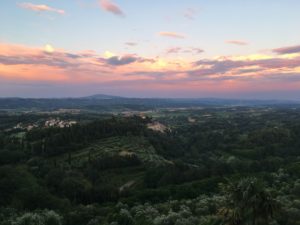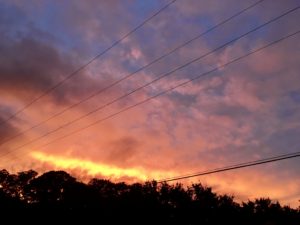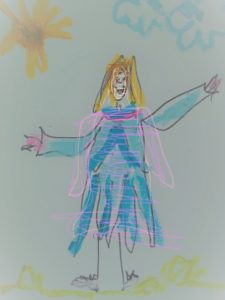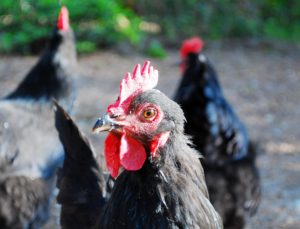
The first word I spoke was Batman, which should have been enough to generate an appropriate and colorful nickname in the family, but Birdie is what stuck—for my relentless fluttering, it is said—and through the years it came to pair well with my love for winged beings. I am enchanted by their delicate charm, their quick, mysterious comings and goings, their enterprising, self-possessed lives, and their graceful, almost self-effacing way of inhabiting the world. Not to mention, of course, the burst of color and song and the unmistakable shot of happiness they provide solely by being. I wish we could be so gracious, us humans.
And so perhaps it was no surprise when some forty years later I decided to raise a flock of chickens, not for food—I am solid vegetarian—but for the experience of expanding myself into the universe. I wanted to rub skin with another species, the most foreign of all, the winged one, the one that pecks and has long scaly toes and those things called waddles. I wanted to understand them.
I ordered them on the phone from a poultry farm in mid-America, figuring I would save at least those eggs from an unhappy ending somewhere else. I had read up on species that were friendly to people and other animals, that got along with other breeds and fared well in South Carolina’s hot climate. I chose Rhode Island Reds, fiery red and full of personality, Plymouth Barred Rocks, with white feathers striped (or barred) with gray, of humble demeanor, and Black Australorps, big, black, and all but humble. All traditional—single-combed and no feathered feet—but hearty, pretty, and kind. The company wouldn’t ship fewer than twenty-four because the chicks rely on their communal body heat to survive the trip in the box, so I ordered eight of each breed.
“Do you want males?” the woman on the phone asked. I had read that most male chicks get thrown in meat shredders, which is one of the many reasons vegans are against the supply chain of eggs. Of course, I said, yes, I would love a couple of roosters. How could one exclude roosters when ordering chickens? Are they not part of the natural order of things?
They said the chicks would be shipped to the post office and to expect an early morning call a few days later. My boyfriend, Aram, and I waited for them like expectant parents and woke to a phone call at 5 a few mornings later. When we knocked at the back door of the post office in Charleston we were let into an entirely empty hall, cavernous and silent but for the tiny piuu, piuu piuu that we heard coming from the rear of the post office. A woman brought us a box no larger than ten by ten and Aram carried it to the car with the care reserved for the transport of nuclear armaments.
The backyard chicken fad had not yet taken root to the extent it has since then, so I was a bit of an anxious pioneer in raising chickens as pets in Charleston. I had asked around a bit, and read a good deal, and I had found a farmer—a real farmer—who raised animals of various sorts. I paid him a visit and he offered advice together with a few pieces of equipment I would need for the birds’ care, including a brooder, a large metal cage that would be the chicks’ home for their first eight weeks of life. It was fall, so I set the brooder up on two saw-horses in the laundry room, next to two electrical radiators, with two heat lamps overhead. A thermometer tied to the wall of the brooder monitored the warmth, which would be essential to the arriving birds.
When we got home we ran to the brooder, placed the little box inside, under the heat of the lamps, and opened the top. The tiny birds, nothing more than puffs with legs and beaks, really, clustered all in one corner, but with the most delicate of hands we took them out, one by one. They had told us to dip each bird’s beak in the water and make sure they drank first thing. Then we showed them their food.
Evidently the person who that previous evening had stuffed my box of barely hatched eggs had decided to throw in an extra few—perhaps because they rarely all make it—and from the box came twenty-seven chicks, one of them conspicuously white, unsolicited and a source of surprise and delight. After taking their long drink of water and pecking about at the food, the baby chicks huddled together under the heat of the lamps. They seemed spry and healthy, all but one, a little black chick who would not drink or eat and who eventually later that day curled up on one side of the brooder and died. It was the first in a long series of mournings I would experience in my life with the chicks, and to commemorate it I put him in a tiny Christmas ornament box from Tiffany and Co. and placed him at the back of the freezer. Every now and then over the following many years I would take him out and look at him, perfectly preserved, to remind myself of the frailty of his short life.
The first week I hovered over the chicks like a hen, monitoring the temperature and their behavior, watching mesmerized as the little puffs of feathers found their way around the brooder, began to socialize and peck one another, and grew. They pooped a lot, and increasingly so, and every day I pulled out the brooder’s newspaper-lined bottom full of poop and hauled it to the compost pile, heavier by the day. The farmer from whom I had sought advice had asked to split the flock with me, and initially I was open to the idea, but after a couple of weeks in their birds’ company, or theirs in mine, I decided I couldn’t possibly let go of half of them. By the time they were as big as full-grown cardinals I called to tell him I was going to keep them all.
“Don’t worry about it,” he said, sounding gruff and redneck, “most of ‘em won’t make it through the winter anyway.” He reminded me that the decision I had made to not vaccinate them or give them antibiotics would surely kill them in short order anyway, particularly if the weather grew rainy and cold, but he was dead wrong, and at the end of winter I was elated they were alive, all of them, perhaps because they were so deeply loved.
By then the chicks were larger than big pigeons and they had moved into their coop, which Aram built thoughtfully and with flair, equipped with hatches and windows, see-through blue plastic walls, roosts of various heights, and perfectly sized nesting boxes. The outer walls of the coop, which I painted turquoise and purple, with a bright green door, opened to a spacious run, the space where the chicks hung out when they were not free to roam the heavily vegetated marsh-front property on which I was lucky to live with my orange tabby cat, Joe. Properly exposed to sun and shade, the run protected them from predators and was full of toys and perches and sticks to climb and sit on, which they did while Joe, Aram, and I watched curiously. I got them electric radiators to warm them on cold nights, fans to cool them in summer, and bales of straw that they pulled apart with boundless energy and curiosity in search for the tiniest of bugs. By the end of a day, straw filled the coop with the wonderful smell of fields. I made sure the chicks had dry areas for dust baths, and grit and calcium, and I bought them fresh fruit and collards and a steady supply of scratch.
The first chick to die at about six months was a Rhode Island Red. I was disappointed to find her keeled over in the coop, strong and big and seemingly healthy. I couldn’t understand why or how this had happened. It was my first taste of the well-masked and heartbreaking fragility of birds that over the years continued to find me woefully unprepared. When I sent her for the autopsy in Columbia, via FedEx in a cooler with dry ice—the first of many such experiences—the pathologist called and said she had died of fatty liver from too much food. Guilt gripped me; she was not even one year old, and it was my fault. I learned to rein in the joy I derived from watching them peck at an endless supply of scratch: no more scratch in summer, the doctor said! Regretfully, that hen died unnamed, but she was the first and the last to be recorded anonymously.
By the dawning of summer the chicks were fully grown and each one had begun to show the shimmer of individuality and had taken her or his place in the dynamic of the flock, both among the three breeds and within her own breed. By then I could tell them all apart and had found the inspiration for the names that would forever capture and identify their singular and unforgettable presences in my life—all twenty-five of them. The black Australorps were the queens of the flock, distinguished by greater physical presence, glossy black feathers with glints of forest green and pink and dark blue, and round, dark brown eyes that communicated with me and in which I saw both a soul and goodness. They were tall and beautiful, all of them, and Bella reigned among them. She was the most regal hen in the flock, and her name, meaning beautiful, came naturally.
Then there were Assunta, Bianca, and Beppa, who hung out like gossipy ladies and who I named after women on the street in the town where I grew up in Italy; Queenie, the most aloof and a bit haughty, with a tall and long crest, and Ellie, whose kind spirit shone through her eyes and left me longing for a common language between us. Rays was so named because at the center of her eyes were amber flecks that seemed to paint little suns and sun rays; she was a favorite of the roosters and her head was often nearly featherless. And then there was Cara, dear in Italian, so named because she was just that—my dearest. A medium-sized black chick, Cara distinguished herself for a quizzical, sweet expression in her brown eyes. She cooed softly around me like she was telling me stories and like I knew what she was talking about, or what she felt. She came to me and sought me out, for company, displaying a tender vulnerability that endeared her to me. She followed me obstinately if I wouldn’t pick her up and hug her above all others. She knew her name, unquestionably, and she trusted me. She had a special relationship with me which she cultivated stubbornly and with love, and by which I was won over and moved.
The Rhode Island Reds, with fiery auburn feathers tinged with red and flashing orange eyes, were the most daring and the most entertaining of the flock, perhaps because they had a funny way of running, very speedily with legs askew, or perhaps because they were the quickest. They seemed to always be the first to get a prize treat or to dig up a juicy worm after a rain storm, then running about to steal it from one another, chasing each other in circles, something they also did for lesser or no fare, like a piece of colored paper. They are playful, sociable creatures, chickens, entertained by the most curious of things. Rossa was the biggest red, and brilliant like fire; Fingers got her name from the remarkable multitude of little fingers on her crest, and Rami, too. Her crest reminded me of branches—rami in Italian—or antlers. La Parisienne got hers because her crest folded over onto itself to one side like a French painter’s beret, making her look inspired and eccentric. Wings, a compact, feisty chick, was so named because she became early on one of the roosters’ favorites, and at one point her wings, sadly battered by their talons, seemed to afflict her horribly, almost like a banner for her low station in life as a chicken, though I believe she looked noble and special. Often I had to shoo the roosters off of her to give her respite and healing.
A Rhode Island Red whose personality eluded me was finally named C.S. Lewis by my friend Tony. She reminded him of the author’s fantastical animals, and her name complimented her to the day she died at the vet’s many months later after a long and unexplained illness. Pesky, the last of the reds, was so named because she was boisterous and in your face, full of personality, traits so true she paid for with her life. One afternoon while the chicks were out roaming, a hawk landed on the property, and while the other hens went running for cover, Pesky, chest forward, orange eyes fluttering with curiosity, walked right up to the rapacious bird, as she would to anything at all. Before she could even begin to understand what she was doing, and before I could intervene, the hawk pecked her right in the head and killed her, straight out. She fell like stunned. I shooed the hawk away and carried Pesky’s little body inside. She died an innocent death, and much too early. I regretted it because she had a long and fun life to live, which I would have hoped to assure her. I learned that I could not assure anything.
Hawks were, for sure, the greatest pest in having chickens. I was always on the lookout and on alert whenever the chicks were outside and roaming on my beautiful, lush property on the South Carolina marsh, which I wanted them to do as much as possible. They are creatures of great curiosity; they love to run and peck and explore and get in the bushes and dig big holes in which to roll around to clean their feathers and the skin under their wings. There is little that has given me as much simple satisfaction and joy as watching the chicks lie about in the dust with the sun on their faces, stretching out their wings and legs in the warmth, their happiness, their peace and sense of safety unmistakable and deeply rewarding. One just knows when something is exactly the way it should be, the way it was meant to be, and it is undeniable.
The Barred Rocks hens, meanwhile, with their barred feathers and yellow beaks, were proper and reserved and kept a bit to themselves. Their eyes, yellow-green, conveyed a bit of superiority, and they reminded me of well-dressed and dignified British ladies at tea with the Queen. I named them Fergie, Abbey, Sarah and Victoria, and to be frank I couldn’t always tell them apart, especially later when they all became strong and broad-chested. Among the Barred Rocks the exception was a hen I called Little Girl, a name I chose because she suddenly ended up at the bottom of the pecking order and was nearly pecked to death and de-feathered. As I held her and sang for her after rescuing her from yet another pecking, I named her, for she was defenseless and small like a little girl, and she began to come to me to sit in my lap and be sung to. Ironically, later Little Girl came to look a lot like an old lady, grumpy and a bit angry, but her spirit, I think, remained intact, defenseless and childlike, as did her name.
The one unmistakable chick, the single white bird, was an Italian White Leghorn who soon emerged as a tall, skinny, boisterous, bossy rooster. To watch him was to watch a comical play on the stereotypes of Italian males. At his beck and call, literally, the hens lined up in quasi-military fashion, whereupon he strutted and flapped his wings and paraded up and down before them like they were his concubines, though they were not honored or flattered but rather terrified and stressed by his bossy manners. In honor of both his personality and his breed, we named him Benny, after Benito Mussolini, and we watched over his growth with humor mixed with alarm for he portended to not be an easy rooster to manage.
Alongside Benny another male, an Australorp, quickly manifested into a regal black rooster with soulful dark brown eyes, long, bright red waddles, and an important, elegant crest. His face was bright red, punctuated by a prominent black-and-gray beak. His feathers were thick, iridescent and velvety, and his legs were strong and long and dressed in what looked like elegant black pantaloons fit for a regal court. Because he was so noble and gentle, as opposed to Benny, I chose for him the name of Juan Carlos, the benevolent king, a name that quickly morphed into JC.
The more he grew the more impressive JC became, not only in pure rooster beauty but in nobility of character, communicating with his hens in a dance of movement and sound that conveyed dominance through protectiveness and care rather than brute force. At dinnertime or treat-time he made a distinct clucking noise to call the chicks to food, letting them eat before he ever touched anything—even the best of treats, such as berries—and at bedtime, at dusk, he made scrupulous rounds of the property, circling any lollygagging hens with his widened wings to get them to return to the coop. JC and I had a rapturous relationship; he loved me and loved to have my attention, though surely genetically it was not what he was bred to tolerate. His pride as a rooster—his DNA—coerced him into making funny pecking motions when I approached, looking down at the ground as if to pretend he didn’t see me or didn’t care; but from his earliest days he surrendered to my attentions. He ran to me when I called, feathers and pantaloons flapping about, and he let me pick him up with ease. I’d pet him and hold him close to me, so close that we would rest his face against mine and close his eyes. I may be anthropomorphizing, I may be, but there are things we know and no one can dissuade me: JC was a creature of love. He felt love, no doubt, and hence he responded with love. He was magnificent.
Overall the Barred Rocks proved to be the calmest and most composed, and perhaps also the kindest, the Rhode Island Reds the most curious, upfront and feisty, and perhaps the friendliest, except for when the Black Australorps were friendly, in which case they were also the sweetest. The Black Australorps turned out also to be the sturdiest and heartiest. They bonded together better, it seemed, as if a code existed between them, which I liked to study and attempt to decode. Bella, Ellie and Queenie were inseparable, and I could tell they gained power both from their size and height and their bond. In the evenings I would pour a glass of wine and go outside to watch them in their run or sit in the coop and listen to their sleeping noises, their breathing and their cooing sounds—this after they had settled into their spots, the strongest taking their favorite places first—Bella always next to JC—and the others fitting where they were accepted. I’d watch, pained, as one chick would get kicked down over and over until she found the hen—lower on the totem pole than her perhaps—who would let her stay, who would let her sleep next to her. I was shocked to discover the literalness of the meaning of the term pecking order, at the top of which was Bella and the roosters, and at the bottom of which sat Rays and Wings and Little Girl, at least on and off. Sometimes it bruised me to watch it.
By then these little animals were becoming known to me and I couldn’t get enough of the excitement of exploration—getting to know the temperature of their toes and their waddles and the feeling of the skin under their wings, the skin that makes lovers of fried chicken or roasted chicken salivate in delight but that feels cool and soft to the tip of my fingers when the chicks are relaxed in my hands and feel loved. They love to be caressed under their wings. By then I had learned to hold them, and most of them would be held, and I learned that even the roosters like to have their heads massaged. When they feel safe they lean their faces against yours and close their eyes. I would hold their toes and examine their scales and nails and smell their heads. I cherished the warmth in my heart that the privilege of that intimacy provided me. It gave me a new and better place in the world.
When the chicks turned one I threw a party for them. It was an opportunity to celebrate and share the unexpected joy and fun that these animals had brought into my life, with no less pride and happiness than a parent throwing a party for a one-year-old child. While people stood outside sipping wine, the chicks ran around pecking at the grass and enjoying their freedom. People brought them grapes and corn and other presents and watched with delight the chicks’ funny way of running and scratching about. People love chickens when they really pay attention, though they don’t stop eating them, unfortunately.
As guests were leaving I noticed a bloody chicken footprint on the porch. I followed a scant trail and as dusk approached I found her, a Barred Rock, under the steps leading up to the back porch. She was lying down and her pink face was pale and still. I examined her feet and found a small cut. I held her for a few minutes, caressing her soft feathers, then she entered the quick and violent convulsions that, I suddenly learned, announce death in a chicken—a last surge of life accompanied by a high-pitched screech. Then she stopped breathing, her head letting go, her yellow beak a tiny bit open. It was only after I laid her to rest that I saw all the many bloody footprints she had left behind; she had bled to death and gone into shock. It was my first real loss of a chicken I had come to know well, the first of many in the adventure of raising these creatures whose delicate health and body structure we have come to neglect or un-observe due to the animal’s underestimation or denigration—pick your favorite word—in our mainstream culture.
We gave Benny away the following fall, after we had had the flock a year. His tirades were miserable and the hens suffered his meanness. Wings had no feathers left, Rays either, and many other hens were withdrawn and not thriving. Phillip at the feed store on Johns Island said he would be happy to take a rooster; he promised to not boil it and to let it roam freely on his family’s property with others he owned. I delivered him and said goodbye. I can’t say I was broken up, but I felt responsible for this cartoon-like animal someone had serendipitously thrown in my box. Better a few years in the wild at Phillips’, I figure, than in the shredder.
After we gave Benny away, as if some genetic key had turned, two unnamed Barred Rock chicks I had tentatively called Diane and Lizzie, manifested as males. One morning I heard a poorly enunciated crow that was not JC’s, and then another. Suddenly there were three roosters again! I remember Aram and I standing watching in disbelief the twin Barred Rock roosters, suddenly tall and with fully feathered and majestic tails. I laughed and said we should call them Fred and Frank, names whose ordinariness in men seemed hilarious when applied to chickens, and that is who they became. Fred and Frank were identical, huge and steely, with bright orange eyes, but for a tiny difference in the spirit that colored their eyes —their personalities were different—and for a finger on Fred’s crest that looked like the funnel on Carnival’s cruise ships.
By then I had begun painting. I had started one day by painting my wedding shoes, pearl-colored, patent leather, by Bruno Magli. I wanted to honor them in the aftermath of divorce, before giving them away. Then I got the chicks, and my attention shifted to their wonder. I trained my eye to the dazzling colors of their feathers, the details of their faces, their eyes, their expressions and demeanor, each different, and their spirits, which spoke loudly to me. I saw things in my chicks; I saw their souls. I did portraits of regal JCs and feisty Franks and moody Little Girls; Fingers with her long-fingered crest, Bella and her beauty, entranced by the camera and always ready to be photographed, and Cara with her tenderness, a connection that felt personal to me. I would spend hours watching them, noticing the idiosyncrasies of each and the habits—how Rays and Little Girl, under constant assault by other hens, would go scratch about the grass farther away; how Wings came first to any call; and how some of them lived more subtle lives, though equally needy of affection. Rossa and Rami were among them; they inhabited the earth lightly, like those of us for whom life is heavy do—with less bombast and noise, hoping perhaps to get by unnoticed, making do with less. They are like us humans in many ways, I have come to understand, shaped as much by the pressures and pushes and pulls of the outside world as by our inner dimensions and proclivities. Rays, a black Australorpe with a kind and sweet disposition, might have been more sociable, perhaps, had she not been pinned down by the beak of a rooster until she had no more feathers on her head to give.
Frank and Fred, meanwhile, spent most of their waking hours chasing each other, strutting and fighting, their feisty, exuberant tails high in the wind, always bargaining with each other over who would dominate what around them. Sometimes they fought each other like competing cocks, twirling and spinning and butting their chests against each other in mid-air. Their rivalry was conspicuous and at times funny to watch, these two huge roosters with big orange eyes and dangerous talons going around and around in circles through the grass and around the property. But, the stress between the males caused upheaval among the females, not to mention that there is not enough space in a household for three male egos, animal or human. JC sometimes intervened, too, taking sides with Frank against the more aggressive Fred who occasionally attacked me as well.
When Phillip at the feed store said he would take another rooster, I decided that Frank, JC, and the flock would be better served if Fred were in the wild. Once again I packed Joe’s cat carrier and delivered him, not without a wave of chagrin. Nearly every time I went to the feed store I’d ask about them, and Phillip would tell me he had seen Benny and Fred a few days earlier or a week earlier, roaming around, happy and free. I always like to think of them that way.
Once Fred was gone, JC and Frank settled into a comfortable sharing of leadership, Frank playing the more aggressive bad-cop role, and JC, living up to his name, making sure the girls got the food that was put out and rounding them up at night for bed. Right before dark I would find them on their roosts, jockeying for their positions and settling in, with JC and Frank among them, mumbling and getting them to settle down. In the morning before the break of dawn JC and Frank roused the marshes of Charleston with their crow, JC’s higher-pitched and rising through the octaves and the miles, and Frank’s lower and powerful enough to hurt your eardrums. If you put your hand in front of his beak you could feel the vibrations of the sound emanating from his puffed chest, full of animal pride and dignity.
“Sing it, Frankie, sing it,” I’d say when I heard him in the afternoon, for Frank sang all day long, just to be in the world, his song resonating with the universal ohm of nature.
By then my world was filled by the chicks and their adventures, and their needs. I scheduled my day according to theirs, trying to balance their freedom and safety and free time with mine, which is what anyone who has taken responsibility for the care of animals must do. With chickens it is particularly onerous as they have predators from air and land, small and big, and in Charleston they seem to be particularly active: fox and weasels, raccoons and possums, hawks and snakes. I have seen all of them and worked tirelessly to fend them off, to ensure that the chicks’ home was safe and predator-free and that they could enjoy as much time in the sunshine as possible.
By then I had moved my painting into the living room, which was the room with most sun. The back door and windows opened onto the back yard and the marsh, and while I painted I could look out and see the chicks spread over the property, JC sunbathing with the hens, and Frank off doing his thing. Joe, who had known the chicks since they were little, had an easy coexistence with them and I dare say he liked them. He was always among them, lying about in the sun with them or watching them. Sometimes Frank would come up on the back steps and look in cockeyed through the panes of glass and sit there with Joe, like they were old friends talking. Frank was not affectionate like JC and it was hard to pick him up, but in his visits on the back steps there was a form of connection, and perhaps communication, too.
One day Aram and I went to an event out in the country up above Georgetown. Before going I had let Frank outside by himself because his crest had been pecked and it was bleeding, leading the chicks to peck on him more. On the way back it was quickly getting dark and I was concerned for Frank’s safety outside alone, unprotected. When we pulled up I ran to look for him—it was fully dark by then—and I found him perched on a window sill of the garage. I picked him up—chickens don’t see in the dark, hence they are defenseless—and it was then that I realized how thin and light he was, a big rooster in feathers alone. The following day I took him to the vet and it was quickly determined that he had parasites. The vet gave him antibiotics, but his downfall was so rapid that by dawn two days later he could not stand up. He lay keeled over on his chest, the weight in the upper part of his body more than his strength could balance.
I was struck with grief and chagrin. I had not known to read the language of the animal who had stood before me on the porch steps feeling sick, and he had wasted away (I learned to read poop after that experience). The vet asked if I wanted to bring him in and I said no, that I would stay with Frank and escort him from this world. I knew it would not be long. On the back porch I pulled out two chairs and sat with my legs outstretched between them with Frank on a blanket on my lap. His head rested in the crook on my knees and his long legs and feet outstretched toward my stomach. What had once been an imposing, substantial bird was reduced to nothing but a thick cover of lustrous feathers. He lay defenseless, surrendered to the inevitability of death of which he was clearly conscious. As I sat with warm tears running down my face, I rubbed slowly under his wings and sang to him, a lullaby of sorts, improvising the words to “Frankie the Rooster” in a variation on “Frosty the Snowman.”
“Frankie the Rooster
Has the mightiest crow of all…”
As I sang to him, he closed his eyes and rested, sometimes so still I thought he was gone, but then his chest would heave and suddenly he’d open his eyes and look at me, and almost try to get up, as if he had somewhere to go, as if he had something to tend to that he had just remembered, but overwhelmed by his weakness he put his head back down and closed his eyes anew.
Some five hours later during which I never got up, after a surge of wild energy ran through him and out again, Frank died in my arms, spent. Blood left his waddles and his crest, and his toes turned cold, and I hugged him to me, this feisty animal who had given me so much joy. It was heartbreaking, as was every death of a chick, and they started coming, oh, did they ever, beginning with Ellie, who died quickly after Frank, of yolk peritonitis, an infection. I took her to the vet, and she got antibiotics, but just not in time. I took her home and made her a bed of towels, and from her sick bed she looked me right in the eyes until I feel asleep alongside her and that final shock of life, that final surge of energy shot through her and a screech woke me to her death.
Frankie’s departure left JC in charge, and this rooster’s understanding of this event was immediate and nothing short of intelligent. He patrolled the chicks with fine-tuned diligence from dawn when he crowed to nighttime when I shut the door to the coop and I knew and he knew that they were safe.
Shortly after, on a beautiful day I had let the chicks roam while I ran an errand, I came home to loud screeches of panic that shot through me even before I opened the car door. When I sprinted to the back of the house I realized that the chicks’ terror was such that they had flown out of the perimeter of the fencing to seek safety and they were clucking rhythmically and in unison from all around, announcing their alarm. I couldn’t see JC, which was bad news. I ran and called and finally I saw him under a tree, an old oak, semi-hidden by the fronds and branches draping low to the ground. I ran to him and saw that the source of the terror was a white owl with terrifying talons and immense wings. He stood nearly two feet tall and had piercing blue eyes.
JC had the owl pinned with his back against the trunk of a tree and his brown eyes were flashing about. His wings stood slightly apart from his body; he was breathing frantically, his chest heaving up and down, and his beak was open in distress. I ran to get a pitchfork and climbed between the fronds of the tree and took over for JC, who stood down but didn’t go far. I stood trembling, holding the pitchfork against the owl’s chest, adrenaline rushing through me. The owl’s wings lay flat and splayed open and his breathing was labored. I wanted to pierce through his white chest with the tines of the pitchfork to defend JC and my flock, but his crystalline eyes burned my soul. He was a protected bird, and a beautiful one, and one never kills a bird anyway. I would not, ever. I knew he knew that I had won, but I was afraid of letting up on the pitchfork, afraid that he would attack JC again or me. After several minutes of stillness, with my heartbeat flooding my head, I released the pitchfork with shaking hands and took a step backward, watching how he calculated his next move. Dazed, perhaps, and still breathing heavily, the owl got up and took a few tentative steps away from JC and out of the tree fronds. I watched his back as he moved into the clearing. He began to move faster until he spread his big wings and took flight and disappeared in the sky.
It took hours to corral all the chicks back into the cordoned side of the property and to get them calmed down. JC’s beak was torn and bleeding and he had lost some feathers in the fight, but he had done his job masterfully and he would recover well, from that at least.
A few days later, unfortunately, I came home and when I let them out I noticed JC had an injured eye, red and swollen like a cherry. He had been pecked by a hen, I surmise. I took him to the vet and he gave medicine and ointments, but the eye never opened again. JC quickly adjusted to seeing and patrolling air and land and 360 degrees around him with one eye. He seemed to manage, but I realized that his duties had become suddenly onerous, a fact made worse a few weeks later by a leg injury that left him limping and practically one-legged. The vet said the leg was sprained and with time it would recover or not. It didn’t. JC looked like a valorous old pirate, and he adjusted but it felt unfair. He redoubled his efforts to keep his hens safe, no matter the effort or the fatigue, but he seemed beaten, humbled, somehow diminished, and at sundown, after rounding up the hens, he looked exhausted. As darkness filled the coop he closed his eye and his head fell forward. I felt grateful to be able to close the door and provide him safety so he could rest his tired wings.
Every night when I put the chicks up I petted each one and took a careful count, whispering their name and a number, making sure they were all there. By then they had all come into their own, inhabited by the spark of her own unique spirit—some with greater courage or audacity, like Wings, some with greater aloofness, like Queenie, and some still with greater tenderness, like Cara, my sweet dear, coming to me and jumping up on my lap. When I opened my hands and turned them palm upwards, Cara would put a foot on each palm and interlace her toes between my fingers, like holding hands. She’d stand there, looking out, seemingly satisfied by this contact as was I.
Eventually I had to leave that house and I moved the chicks to new digs on Edgewater Park, a little hamlet on an island a few minutes from downtown. The chicks liked it there. Aram built them a beautiful new coop, more compact and more efficient for me to clean and keep safe, and a nice run in the back, sunny in winter but heavily vegetated and cool in summer. At dusk they’d hop up into their coop and onto their roosts and I’d close the coop door behind them, leaving open the door to the run so they could enjoy the breezes. When I went to bed I’d go in and close the door to the run, too, so they could be safer from predators.
Yet, 2011 ended up being a fatal year for the chicks, both before and after the move. Fingers turned lethargic and feverish; she had fluid in her body, the vet said, and I had her put to sleep. Shortly after followed Rossa, a sturdy Rhode Island red, and C.S. Lewis, and Beppina, too; they had cancers or inflammations or infections, most all of them in their reproductive systems, overburdened by egg-laying they were not meant by nature to do. Their systems were worn out. I wanted to tell them all to stop laying eggs—that their worth to me was not in eggs but in love—but they are programmed by mankind, and recent genome sequencing of chickens shows this to be true. When they became sick I procrastinated putting them down, my reluctance reinforced by their stubborn way of concealing illness to protect themselves in the flock, but ultimately their feelings were undeniable. Little Girl, who hadn’t felt well in months but feigned health, followed. She had stopped filing her beak, which chickens do daily on stones and other hard surfaces, and it grew so long she could no longer eat until Aram and I cut it with fingernail clippers, but she still wouldn’t eat. Her nails grew long, too, and she just seemed to not want to live. I held bittersweet memories of how Little Girl had lived her life, bossed around by others, and I wanted her to live longer and better. I didn’t want it to end that way, but finally I took her, wrapped in a towel, and said goodbye. Then La Parisienne died too—I found her head-first in a nesting box, already dead—and then Sarah, one of the “English tea ladies,” also of unknown causes.
During the course of a short few months six hens died and the flock felt thinned out and strained, or perhaps that was just me projecting how I felt. Every time a chick got sick it was a run to the vet, a surge of guilt and powerlessness, and, cost aside, which was remarkable in itself, it tore me up. It had become all too clear to me that these beings our humanity thinks little of except for how well they will fry or roast are delicate and personable and that taking care of them requires a constant vigilance of which I had not enough. I was exhausted and broke, and every night when I petted them goodnight the diminishing count weighed on me.
Then, suddenly JC became uncharacteristically aggressive and attacked me in the coop with all his might, twirling and thrusting himself against my legs. The first time it happened I was stunned—horrified and heartbroken, really. I went outside and cried like a mother stunned by a child. I couldn’t fathom this happening in this most beautiful and trusting relationship with this noble, docile bird. What had I done? What had happened to him? The vet said JC probably held us responsible for the disappearance of his girls, as if I were stealing them, and he was determined to protect those that were left. He said that perhaps it would pass, but it was summer and I had to be out of town for work. I couldn’t ask people to take care of the chicks with a menacing rooster. I waited a couple of weeks but he attacked every time a person got near and I concluded that I had to give him away
Phillip offered to take him. On the chosen day I picked JC up and hugged him to me for the last time. He leaned his warm face against mine and closed his eye. I caressed his face and felt the sturdiness of his body against my arms. I put him in Joe’s carrier and as I drove I rationalized this decision that I hated with all my heart. I took watermelon for him and when I left him he was looking down and pecking away at his watermelon, like he was pretending he didn’t know what was going on, and I will never forget the gleam in his black feathers and how his one brown eye followed me as I walked away, leaving him, though he pretended to not look. I have no doubt of the love in that eye, and he knew it was goodbye.
For months afterwards—years have since flown by—I would ask Phillip if he had seen the roosters, JC in particular, and he said yes, sometimes at his uncle’s house, and sometimes at his dad’s. But recently I saw Phillip at the grocery store and when I asked if he ever saw the roosters his eyes left mine. He looked down the aisle and down into his cart and shook his head. In my care JC could have been alive today; in the wild, I doubt he is. I will always think of JC as the magical rooster from a fairy tale in which I was privileged to play a minor part. JC was the hero, and an extraordinary rooster.
After JC’s departure, the chikkies’ world felt changed, deprived of some kind of wonder, at least for me. As for them, their dynamic shifted again—Bella took a more dominant role—but they seemed relaxed and at ease and perhaps stronger. The remaining thirteen got along well; they had their routines, a peaceful pecking order, it seemed, and even Rays regrew feathers on her head. They spent their days in the sun and running in the grass and pecking in the bushes, and when it rained they got under the porch and climbed up on my painting table and sat around on my paints, waiting for it to stop. Surrounding them on the walls of the back porch were my paintings of them, large unstretched canvases portraying them in the most fantastical of colors. I always wondered if they could make out the images of themselves to see what starlets they were in my world.
Once a magazine in Charleston contacted me for an interview on backyard chickens. By then the fad had caught on fully, and since I’d been one of the first to have them they wanted to take pictures. A photographer came out; he had in mind a portrait of a single chicken, and I chose Wings. She was courageous and flirty and photogenic. When the photographer laid out a white drape for her to stand on she took center stage as if she were on the red carpet, an Oscar nominee. She pranced and posed under the flashing lights—I sense she knew it was an important occasion—and she didn’t even poop on the drape, which I was sure she was going to do. She was featured on the cover of the magazine, and her pride was manifest. Wings was funny; she would follow me around and peck at my toes until I picked her up and held her and rubbed under her wings. When I went into the coop to get the eggs she would follow me—in spite of my efforts at inconspicuousness—and talk to me the whole time. By then I had stopped eating the chicks’ eggs. I couldn’t make myself anymore; I couldn’t ignore their awareness, indisputable, of the fact that I was taking something that was theirs. I felt guilty, like I was stealing, which I was.
The next year thinned the flock further, though by then the chicks were five years old and, as odds for chickens go, they were doing pretty well. The vet, who was an exotic animal and avian specialist, said it was to be expected: the chicks were not built for the constant egg-laying or, in the wild, long lives. Abbey, another barred rock, a very reserved but affectionate hen, got sick. She had been pecked in the back and had lost a lot of feathers on her behind. One morning she wouldn’t get out of a nesting box and when I pulled her out I realized her temperature was very high. When I looked at her behind—a chicken’s butt tells all sorts of things—I was horrified to find it swarming with maggots. Evidently she had had a wound and a fly had laid an egg in it. Wincing with disgust I tried to wash her off with a hose, and Abbey just looked at me meekly and quietly, her yellow eyes subdued in her pale pink face. Vanquished, I wrapped her in a towel and put her in a box and took her downtown to the vet. I showed them and they shook their heads. By then my chicks were like regular patients there, but I had no money for medical care anymore. I had no more money for autopsies and treatments, and she had to be put down. Abbey looked at me. I caressed her head. I am sorry, I said. It felt like I had said it so many times, and each time it felt hollower and more helpless.
Meanwhile Rami, the Rhode Island Red with a comb that looked like disorderly twigs, took to theatrical antics to get my attention. Most likely she wasn’t feeling well, and perhaps the other hens were bothering her, but she took to playing dead. The first time she did it she scared me half to death: I opened the coop one morning and found her lying there like she was dead. I picked her up, and after letting the other chicks into the run, I took Rami outside with me. I put her on the grass and after a few seconds she opened her eyes, wiggled herself onto her feet and started pecking around normally, as if nothing had happened. I let her spend the day outside by herself and she seemed fine. A few days later she did the same thing, and then again, until she learned that this playing dead act earned her full days of freedom away from the others, and perhaps that is what she needed. Until then Rami had just blended in with the flock, undistinguished by any particular trait or behavior, and this sudden shift got my attention. Her ingenuity—her display of intelligence—endeared her to me suddenly and I realized her vulnerability and sweetness. I let her out every day, at least for a little while, and she loved it.
One evening a couple of months later when I was putting up the chicks I realized Rami was missing. It was dusk and I couldn’t find her anywhere. Her little frame was simply not there. The following morning I looked again, all over the property, and finally I found bones under the coop—her hip bone and leg bones half hidden in sand. That was it, a couple of bones, cleaned like chicken bones at Sunday dinner. I sat in the dirt and held the bones in my palms and looked around. It was then that I realized that the feathers strewn all over the run were hers—not from hens fighting. I also found a small hole dug under the run’s foundation. I realized that Rami had been missing the whole previous day and that she had been likely killed at bedtime the previous night, probably during the window of time between them going to bed and me going to bed and closing the door of the run. The animal, a weasel, likely, snatched her up, the lowest on the pecking order, the first near the door, and sick.
Few experiences have left me feeling as powerless and wracked with regret. I had just got to know Rami, to notice her, really, to connect with her, and I had failed to protect her, probably at her weakest. That stung because by then I thought I had learned about predators and seen them face to face. I had followed red fox and written stories about them; I had trapped raccoons and possums and relocated dozens; I had fought with hawks and owls, and I had pulled 8-foot snakes out of the coop with my bare hands, screaming like a madwoman from the horror of feeling this odd thing between my hands that everything instinctual told me I should not hold.
Finding snakes dangling inside the coop door in the semi-darkness or finding them rolled up eating eggs in the nesting boxes was not my preferred experience, for sure; it was unnerving as hell. And so was coaxing eggs out of Cara’s cloaca, at least the first time. She had begun to get eggs stuck inside her and she needed help to deliver them or she would die. I knew when she was in distress: She’d go into a nesting box, pant and turn around in a circle and sit down; then she’d come out again panting, her cloaca pulsing but no egg. She’d come stand right in front of me and look at me until I understood. I learned to take her under one arm, pour olive oil into her cloaca with the other hand, and with a couple of fingers inserted inside her, slowly slide the egg out. Cara was thrilled to be free of it, and she’s show me by running through the grass like a kid. I knew.
The snakes, maggots, Cara’s toes and stuck eggs all knocked down my innermost and most primordial preconceptions of difference between species and expanded the vocabulary of my love. They helped me overcome the limits of my humanity—my petulant, capricious squeamishness—and expanded the boundaries of my senses into the temperature and feel of their toes and the smell of their wings in the sun. I tore down the walls of my self. I could be them; I could be a bird. I am a bird.
When the chicks were five I decided I needed to do something I had wanted to do all my life—to go back to Italy for a year, to the town where I grew up—and this would require me to put my belongings in storage and leave everything behind, including Joe, my cat, and the chicks. It was an epic interior battle for me to put this project ahead of the chicks—to put myself ahead of them. To rescue my life from theirs, in a way. Looking for someone to take chickens is different from looking for someone to take a dog; few people have chickens, most people don’t understand their nature or the required care, and I was picky. How much space would they have? Would they be free to roam? Would they give them scratch and rub them under their wings?
A plantation in Charleston agreed to take them and I thought it would be the perfect place. They had land and freedom. I took them in boxes, at sunset, so the night would help settle them with the resident chickens. Leaving them was unimaginably difficult. I was wracked by regret and guilt and love. I was lovesick. After they were gone I spent many hours sitting alone in their coop. I smelled the grassy straw and the dust of their feathers and felt the rays of sun that crossed their coop lengthwise at sunset when they never wanted to go to bed, when they clung to the last minute of light, like people in summer, like the eternal kids who never want to rest. I thought of the children I would never have, the love that fills me that I would never be able to spread. I smelled the earth and listened to the silence, the absence of their cooing and pecking and bickering. Their fans stood quiet, dust on the still blades and the dangling cords, and their feeders and bowls abandoned. Their departure summoned my most bittersweet longings about life and love and the passing of time and this yearning of ours—of mine—to leave something behind, to take off our loneliness like an uncomfortable piece of clothing and to feel connected, forever, ever more. I wanted to lie down in the coop and die.
I realized that my life with the chicks had spun what I had sought—tenuous, miraculous weavings, embodiments of the invincible opportunity for connection that life offers between us all, like a giant spider web. They extended me into universality and filled my longing to be one with other beings and other species. We are one—if we let the oneness happen.
The plantation turned out to not be perfect after all. The chicks were too free, and too alone. No one paid them any attention. Victoria died the first day—she keeled over, surrounded by the resident chickens—and Bella a week later. I went up to see them and her absence snuck up on me like a wave of nausea and I wanted to be sick. Staff said they found her lying there in the yard of the plantation where the tourists walk about. Of stress, I know. Heartbreak. I had never imagined that, of all of them, Bella the indomitable would die like that, alone and scared, and I regret that I didn’t get to bury her, or Victoria either. They “disposed” of them. Victoria was the last of the Barred Rocks and the last of the little “British ladies club.”
I smile thinking of the immensity and color with which those little birds filled my life; yet the memory of each holds an intense spasm of regret, for, for every joyful attachment and loving connection, there is separation and eventually death, sometimes avoidable. Their little faces parade before me, twenty-seven encounters, and twenty-seven losses. Twenty-seven slices of my heart.
Before going to Italy I rescued the remaining chicks back from the plantation and drove them to the house of a friend, Willis, who offered at the last minute to take them in. Six of the chicks, now seven years old, are still alive—Wings, Cara, Rays, Ellie, Queenie, and Bianca—and the other day I went to see them at Willis’ house. I hadn’t seen them in eighteen months. I called for them as I usually did—Chik-chik-chikkies!!—and they came running. Do they remember me, as we define memory? I don’t know.
If birds are able to migrate to the same spot every year in the wild, why would my chicks not remember me? They know safety, and they remember that. They know love, and for sure they remember love. We all remember love. Cara came to me and cooed. She looked me in the eyes. I picked her up and rubbed under her wings, then she curled her toes between my fingers and rested her face against mine.
